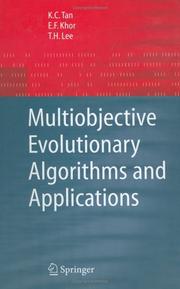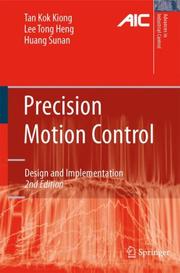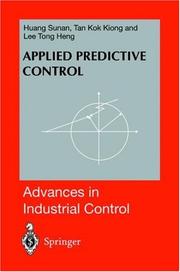| Listing 1 - 10 of 20 | << page >> |
Sort by
|
Book
ISBN: 3030526933 3030526925 Year: 2021 Publisher: Cham, Switzerland : Springer,
Abstract | Keywords | Export | Availability | Bookmark
 Loading...
Loading...Choose an application
- Reference Manager
- EndNote
- RefWorks (Direct export to RefWorks)
Force and Position Control of Mechatronic Systems provides an overview of the general concepts and technologies in the area of force and position control. Novel ideas and innovations related to this area are presented and reported in detail, and examples of applications in medical technology are given. The book begins by introducing force sensing, and modelling of contacting objects. In then moves steadily through a variety of topics, including: • disturbance observer-based force estimation; • force-based supervisory control; • stabilization systems; • controller design; and • control of tube insertion procedures. This book will be of interest to researchers, engineers and students interested in force control, particularly those with a focus on medical applications of these ideas. Advances in Industrial Control reports and encourages the transfer of technology in control engineering. The rapid development of control technology has an impact on all areas of the control discipline. The series offers an opportunity for researchers to present an extended exposition of new work in all aspects of industrial control.
Control engineering. --- System theory. --- Mechatronics. --- Control and Systems Theory. --- Systems Theory, Control. --- Mechanical engineering --- Microelectronics --- Microelectromechanical systems --- Systems, Theory of --- Systems science --- Science --- Control engineering --- Control equipment --- Control theory --- Engineering instruments --- Automation --- Programmable controllers --- Philosophy --- Medical instruments and apparatus --- Detectors. --- Design and construction. --- Sensors --- Physical instruments --- Apparatus, Medical --- Instruments, Medical --- Medical apparatus --- Medical devices --- Medical products --- Medicine --- Biomedical engineering --- Medical supplies --- Scientific apparatus and instruments --- Apparatus --- Equipment and supplies --- Instruments
Book
Abstract | Keywords | Export | Availability | Bookmark
 Loading...
Loading...Choose an application
- Reference Manager
- EndNote
- RefWorks (Direct export to RefWorks)

ISBN: 1280308281 9786610308286 1846281326 1852338369 1849969353 Year: 2005 Publisher: London : Springer,
Abstract | Keywords | Export | Availability | Bookmark
 Loading...
Loading...Choose an application
- Reference Manager
- EndNote
- RefWorks (Direct export to RefWorks)
Multiobjective Evolutionary Algorithms and Applications provides comprehensive treatment on the design of multiobjective evolutionary algorithms and their applications in domains covering areas such as control and scheduling. Emphasizing both the theoretical developments and the practical implementation of multiobjective evolutionary algorithms, a profound mathematical knowledge is not required. Written for a wide readership, engineers, researchers, senior undergraduates and graduate students interested in the field of evolutionary algorithms and multiobjective optimization with some basic knowledge of evolutionary computation will find this book a useful addition to their book case.
Computer algorithms. --- Evolutionary computation. --- Mathematical optimization. --- Optimization (Mathematics) --- Optimization techniques --- Optimization theory --- Systems optimization --- Mathematical analysis --- Maxima and minima --- Operations research --- Simulation methods --- System analysis --- Computation, Evolutionary --- Neural networks (Computer science) --- Algorithms --- Information theory. --- Computer software. --- Information systems. --- Theory of Computation. --- Algorithm Analysis and Problem Complexity. --- Computer Appl. in Administrative Data Processing. --- Information Systems Applications (incl. Internet). --- Communication theory --- Communication --- Cybernetics --- Software, Computer --- Computer systems --- Computers. --- Algorithms. --- Application software. --- Application computer programs --- Application computer software --- Applications software --- Apps (Computer software) --- Computer software --- Algorism --- Algebra --- Arithmetic --- Automatic computers --- Automatic data processors --- Computer hardware --- Computing machines (Computers) --- Electronic brains --- Electronic calculating-machines --- Electronic computers --- Hardware, Computer --- Machine theory --- Calculators --- Cyberspace --- Foundations

ISBN: 1281139084 9786611139087 1848000219 1848000200 Year: 2008 Publisher: New York : Springer,
Abstract | Keywords | Export | Availability | Bookmark
 Loading...
Loading...Choose an application
- Reference Manager
- EndNote
- RefWorks (Direct export to RefWorks)
Applications of precision engineering, generally defined as manufacturing to tolerances that are better than one part in 105, abound and can be found in various semiconductor processes (e.g., lithography, wafer probing, inspection), co-ordinate measuring machines, precision metrology systems (e.g., scanning probe microscopy), and robot/machine tools to carry out micro-assembly (e.g., micro-electro-mechanical systems) and delicate short-wavelength laser processes. Precision Motion Control (second edition) focuses on enabling technologies for precision engineering - issues of direct importance to be addressed in the overall system design and realization: precision instrumentation and measurement, geometrical calibration and compensation, and motion control. It is a compilation of the most important results and publications from a major project that develops a state-of-the-art, high-speed, ultra-precision robotic system. The second edition has been extensively edited and rewritten throughout with the following particular areas being expanded or added: • piezoelectric actuators; • fine movement control; • gantry-stage control; • interpolation of quadrature encoder signals; • geometrical error modelling for single-, dual- and general-XY-axis stages. By providing detailed experimental verifications of the material developed, a comprehensive and thorough treatment of the subject matter is provided in a manner that is accessible to a broad base of readers, ranging from academics to practitioners. Praise for the first edition: …a refreshing and much needed addition to the field of precision engineering… well written, readable, and concise yet comprehensive. International Journal of Robust and Nonlinear Control …an excellent single source of essential topics related to precision motion control. Applied Mechanics Reviews Advances in Industrial Control aims to report and encourage the transfer of technology in control engineering. The rapid development of control technology has an impact on all areas of the control discipline. The series offers an opportunity for researchers to present an extended exposition of new work in all aspects of industrial control.
Motion control devices. --- Automatic control. --- Control devices, Motion --- Devices, Motion control --- Electromechanical devices --- Control engineering --- Control equipment --- Control theory --- Engineering instruments --- Automation --- Programmable controllers
Book
ISBN: 0857296345 9786613923752 0857296353 1283611309 Year: 2011 Publisher: New York : Springer,
Abstract | Keywords | Export | Availability | Bookmark
 Loading...
Loading...Choose an application
- Reference Manager
- EndNote
- RefWorks (Direct export to RefWorks)
Unmanned Rotorcraft Systems explores the research and development of fully-functional miniature rotorcraft unmanned aerial vehicles (UAV), and provides a complete treatment of their design. The unmanned system is an integration of advanced technologies developed in communications, computing, and control areas. It is a useful testing ground for trialing and implementing modern control techniques despite the challenges introduced by the limitations on direct scalability between the systems of a small-scale rotorcraft and those of its full-scale counterpart. Included are detailed expositions of: systematic hardware construction; software systems integration; aerodynamic modeling; and automatic flight control system design. Emphasis is placed on the cooperative control and flight formation of multiple UAVs, vision-based ground-target tracking, and landing on moving platforms. Other issues such as the development of indoor micro aerial vehicles (that have to operate without access to a global positioning system) and vision-based navigation are also discussed in depth. The text is rounded out with a presentation of possible future research directions for relevant fields of study. Unmanned Rotorcraft Systems will be of great value to practicing engineers in aerospace-related industries and to academic researchers from aerospace, electrical or mechanical engineering backgrounds working on the development of unmanned systems.
Drone aircraft -- Automatic control. --- Drone aircraft. --- Drone aircraft --- Helicopters --- Mechanical Engineering --- Engineering & Applied Sciences --- Mechanical Engineering - General --- Aeronautics Engineering & Astronautics --- Design and construction --- Design and construction. --- Copters --- Drones (Aircraft) --- Pilotless aircraft --- Remotely piloted aircraft --- UAVs (Unmanned aerial vehicles) --- Unmanned aerial vehicles --- Engineering. --- Microprogramming. --- Artificial intelligence. --- Aerospace engineering. --- Astronautics. --- Control engineering. --- Robotics. --- Automation. --- Control. --- Artificial Intelligence (incl. Robotics). --- Aerospace Technology and Astronautics. --- Robotics and Automation. --- Control Structures and Microprogramming. --- Aeronautics --- Flying-machines --- Ground-effect machines --- Vehicles, Remotely piloted --- Airplanes --- Radio control --- Control and Systems Theory. --- Artificial Intelligence. --- Computer programming --- Space sciences --- Astrodynamics --- Space flight --- Space vehicles --- AI (Artificial intelligence) --- Artificial thinking --- Electronic brains --- Intellectronics --- Intelligence, Artificial --- Intelligent machines --- Machine intelligence --- Thinking, Artificial --- Bionics --- Cognitive science --- Digital computer simulation --- Electronic data processing --- Logic machines --- Machine theory --- Self-organizing systems --- Simulation methods --- Fifth generation computers --- Neural computers --- Microprogramming . --- Automatic factories --- Automatic production --- Computer control --- Engineering cybernetics --- Factories --- Industrial engineering --- Mechanization --- Assembly-line methods --- Automatic control --- Automatic machinery --- CAD/CAM systems --- Robotics --- Automation --- Aeronautical engineering --- Astronautics --- Engineering --- Control engineering --- Control equipment --- Control theory --- Engineering instruments --- Programmable controllers
Book
ISBN: 1848821743 1849968241 9786611927462 1281927465 1848821751 Year: 2009 Publisher: New York : Springer,
Abstract | Keywords | Export | Availability | Bookmark
 Loading...
Loading...Choose an application
- Reference Manager
- EndNote
- RefWorks (Direct export to RefWorks)
Iterative learning control (ILC) has been a major control design methodology for twenty years; numerous algorithms have been developed to solve real-time control problems, from MEMS to batch reactors, characterised by repetitive control operations. Real-time Iterative Learning Control demonstrates how the latest advances in ILC can be applied to a number of plants widely encountered in practice. The authors provide a hitherto lacking systematic introduction to real-time ILC design and source of illustrative case studies for ILC problem solving; the fundamental concepts, schematics, configurations and generic guidelines for ILC design and implementation are enhanced by a well-selected group of representative, simple and easy-to-learn example applications. Key issues in ILC design and implementation in the linear and nonlinear plants that pervade mechatronics and batch processes are addressed. In particular, the book discusses: • ILC design in the continuous- and discrete-time domains; • design in the frequency and time domains; • design with problem-specific performance objectives including robustness and optimality; • design by means of classical tools based on Bode plots and state space; and • iterative-learning-based parametric identification. Real-time Iterative Learning Control will interest control engineers looking for examples of how this important control technique can be applied to a variety of real-life problems. With its systematic formulation and analysis of different system properties and performance and its exposition of open problems, academics and graduate students working in control will find it a useful reference to the current status of ILC.
Intelligent control systems. --- Iterative methods (Mathematics). --- Real-time control. --- Intelligent control systems --- Real-time control --- Iterative methods (Mathematics) --- Mechanical Engineering - General --- Mechanical Engineering --- Engineering & Applied Sciences --- Numerical analysis. --- Robotics. --- Iteration (Mathematics) --- Engineering. --- Chemical engineering. --- Engineering design. --- Control engineering. --- Manufacturing industries. --- Machines. --- Tools. --- Electronics. --- Microelectronics. --- Control. --- Industrial Chemistry/Chemical Engineering. --- Manufacturing, Machines, Tools. --- Engineering Design. --- Electronics and Microelectronics, Instrumentation. --- Automation --- Machine theory --- Mathematical analysis --- Numerical analysis --- Manufactures. --- Control and Systems Theory. --- Manufacturing, Machines, Tools, Processes. --- Manufactured goods --- Manufactured products --- Products --- Products, Manufactured --- Commercial products --- Manufacturing industries --- Chemistry, Industrial --- Engineering, Chemical --- Industrial chemistry --- Engineering --- Chemistry, Technical --- Metallurgy --- Electrical engineering --- Physical sciences --- Design, Engineering --- Industrial design --- Strains and stresses --- Design --- Microminiature electronic equipment --- Microminiaturization (Electronics) --- Electronics --- Microtechnology --- Semiconductors --- Miniature electronic equipment --- Control engineering --- Control equipment --- Control theory --- Engineering instruments --- Programmable controllers
Book
ISBN: 9811630887 9811630895 Year: 2022 Publisher: Singapore : Springer,
Abstract | Keywords | Export | Availability | Bookmark
 Loading...
Loading...Choose an application
- Reference Manager
- EndNote
- RefWorks (Direct export to RefWorks)
Stability. --- Control theory. --- Dynamics --- Machine theory --- Mechanics --- Motion --- Vibration --- Benjamin-Feir instability --- Equilibrium

ISBN: 1852333383 Year: 2002 Publisher: New York (N.Y.) : Springer,
Abstract | Keywords | Export | Availability | Bookmark
 Loading...
Loading...Choose an application
- Reference Manager
- EndNote
- RefWorks (Direct export to RefWorks)
Digital
ISBN: 9783540495543 Year: 2007 Publisher: Berlin, Heidelberg Springer-Verlag Berlin Heidelberg
Abstract | Keywords | Export | Availability | Bookmark
 Loading...
Loading...Choose an application
- Reference Manager
- EndNote
- RefWorks (Direct export to RefWorks)
Applied physical engineering --- Engineering sciences. Technology --- procesautomatisering --- systeemtheorie --- systeembeheer --- regeltechniek
Multi
ISBN: 9781848821750 Year: 2009 Publisher: London Springer London
Abstract | Keywords | Export | Availability | Bookmark
 Loading...
Loading...Choose an application
- Reference Manager
- EndNote
- RefWorks (Direct export to RefWorks)
Iterative learning control (ILC) has been a major control design methodology for twenty years; numerous algorithms have been developed to solve real-time control problems, from MEMS to batch reactors, characterised by repetitive control operations. Real-time Iterative Learning Control demonstrates how the latest advances in ILC can be applied to a number of plants widely encountered in practice. The authors provide a hitherto lacking systematic introduction to real-time ILC design and source of illustrative case studies for ILC problem solving; the fundamental concepts, schematics, configurations and generic guidelines for ILC design and implementation are enhanced by a well-selected group of representative, simple and easy-to-learn example applications. Key issues in ILC design and implementation in the linear and nonlinear plants that pervade mechatronics and batch processes are addressed. In particular, the book discusses: ¢ ILC design in the continuous- and discrete-time domains; ¢ design in the frequency and time domains; ¢ design with problem-specific performance objectives including robustness and optimality; ¢ design by means of classical tools based on Bode plots and state space; and ¢ iterative-learning-based parametric identification. Real-time Iterative Learning Control will interest control engineers looking for examples of how this important control technique can be applied to a variety of real-life problems. With its systematic formulation and analysis of different system properties and performance and its exposition of open problems, academics and graduate students working in control will find it a useful reference to the current status of ILC.
Materials sciences --- Electronics --- Engineering sciences. Technology --- Plant and equipment --- Production management --- Artificial intelligence. Robotics. Simulation. Graphics --- mechatronica --- DFMA (design for manufacture and assembly) --- BIT (biochemische ingenieurstechnieken) --- elektronica --- machines --- ingenieurswetenschappen --- robots
| Listing 1 - 10 of 20 | << page >> |
Sort by
|

 Search
Search Feedback
Feedback About UniCat
About UniCat  Help
Help News
News